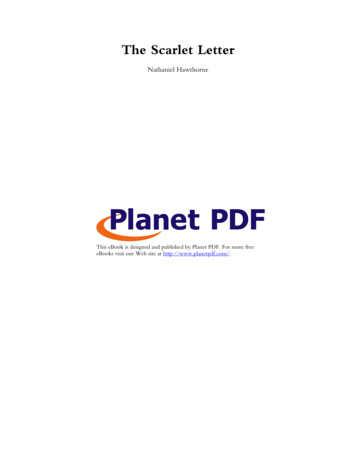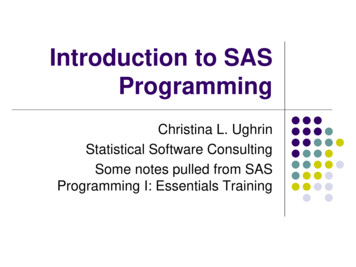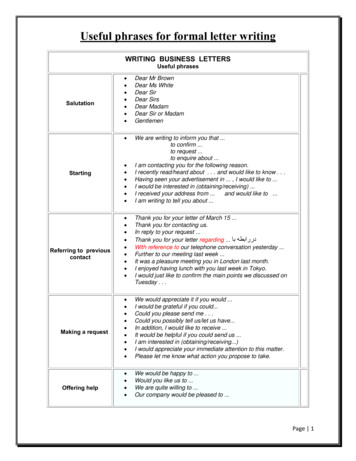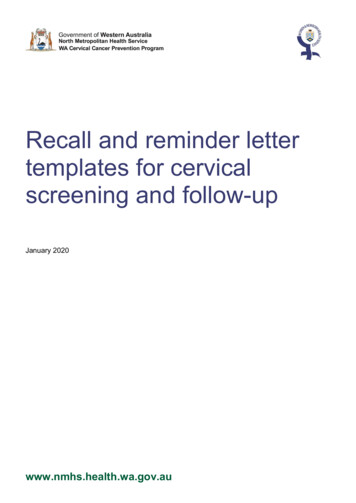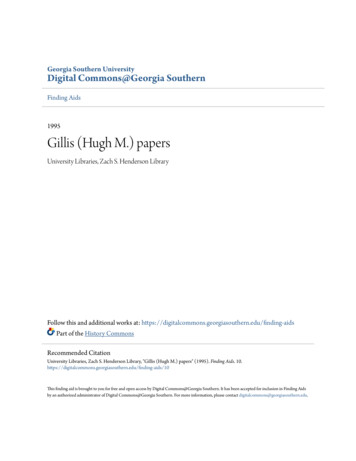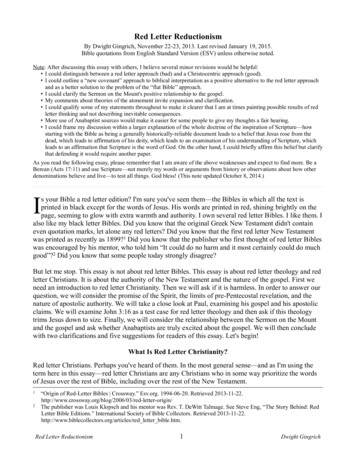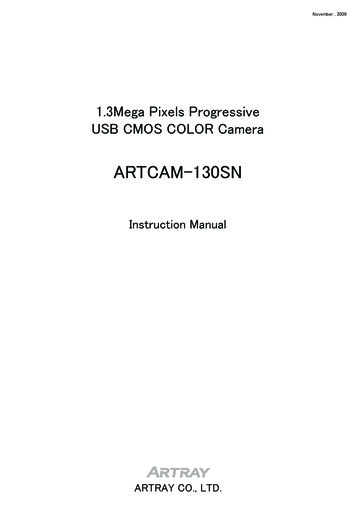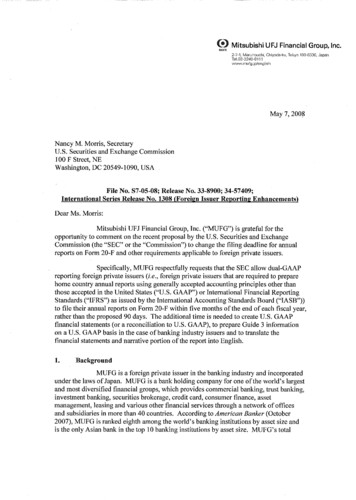
Transcription
@Mitsubishi UFJ Financial Group, lnc.sure2.7-1. tdulunouclll, Chiyodu-ku, Tokyo 100-S330,JapanTe1.03 3240 8111ww w.ml#tg.jp!engl shMay 7,2008Nancy M. Morris, SecretaryU.S. Securities and Exchange Commission100 F Street, NEWashington, DC 20549-1090, USAFile No. S7-05-08; Release No. 33-8900; 34-57409;International Series Release No. 1308 (Foreign Issuer Reporting Enhancements)Dear Ms. Morris:Mitsubisl iUFJ Financial Group, Inc. ("MUFG") is grateful for theopportunity to comment on the recent proposal by the U.S. Securities and ExchangeCommission (the "SEC" or the "Commission") to change the filing deadline for annualreports on Form 20-F and other requirements applicable to foreign private issuers.Specifically, MUFG respectfully requests that the SEC allow dual-GAAPreporting foreign private issuers (i.e., foreign private issuers that are required to preparehome country annual reports using generally accepted accounting principles other thanthose accepted in the United States ("U.S. GAAP") or International Financial ReportingStandards ("IFRS") as issued by the International Accounting Standards Board ("IASB"))to file their annual reports on Form 20-F within five months of the end of each fiscal year,rather than the proposed 90 days. The additional time is needed to create U.S. GAAPfinancial statements (or a reconciliation to U.S. GAAP), to prepare Guide 3 informationon a U.S. GAAP basis in the case of banking industry issuers and to translate thefinancial statements and narrative portion of the report into English.1.BackgroundMUFG is a foreign private issuer in the banking industry and incorporatedunder the laws of Japan. MUFG is a bank holding company for one of the world's largestand most diversified financial groups, which provides commercial banking, trust banking,investment banking, securities brokerage, credit card, consumer finance, assetmanagement, leasing and various other financial services through a network of officesand subsidiaries in more than 40 countries. According to American Banker (October2007), MUFG is ranked eighth among the world's banking institutions by asset size andis the only Asian bank in the top 10 banking institutions by asset size. MUFG's total
assets amounted to Y188 trillion (approximately US 1.8 trillion) as of September 30,2007. Based on market capitalization as of March 28,2008, MUFG had the 12th largestmarket capitalization among banking institutions globally. MUFG's common stock islisted on the Tokyo Stock Exchange, the Osaka Securities Exchange and the NagoyaStock Exchange in Japan. American depositary shares ("ADSs"), each representing oneshare of MUFG common stock, have been listed on the New York Stock Exchange since1989. Accordingly, MUFG has been making periodic filings pursuant to Section 13(a) ofthe U.S. Securities Exchange Act of 1934 (the "1934 Act"). The average daily tradingvolume of MUFG's ADSs in the United States for the 12 months ended March 31,2008,however, represented less than 5% of the worldwide trading volume of MUFG's commonstock.One of MUFG's principal subsidiaries, The Bank of Tokyo-MitsubishiUFJ, Ltd. ("BTMU"), is also an SEC-registrant. BTMU is a major commercial bank inJapan that provides a broad range of domestic and international banking services from itsoffices in Japan and around the world. Although it does not have any securities listed inthe United States, BTMU has been making periodic filings pursuant to Section 15(d) ofthe 1934 Act with respect to its 2.0 billion aggregate principal amount of 8.40% globalsenior subordinated notes due April 15,2010.As Japanese banking institutions, MUFG and BTMU are subject tosupervision and inspection by a number of Japanese regulators, including The Bank ofJapan, the Financial Services Agency of Japan (the "FSA") and the Deposit InsuranceCorporation of Japan. In order to comply with applicable Japanese banking regulations,MUFG and BTMU are required to prepare and file financial statements under generallyaccepted accounting principles as used in Japan ("Japan GAAP") within three months ofthe end of each fiscal year. Given such requirement, MUFG and BTMU utilize thefinancial statements prepared under Japan GAAP for their disclosure purposes underapplicable Japanese securities laws. On the other hand, for purposes of satisfying theForm 20-F financial disclosure requirements, MUFG and BTMU prepare and publishfinancial statements under U.S. GAAP. As discussed in detail below, the preparation oftwo sets of financial statements and other Form 20-F annual report disclosure items is asignificant undertaking. As a result, over the past five years, MUFG and BTMU (or theirpredecessors) have generally needed nearly the full permitted six months after their fiscalyear-end to prepare and file their Form 20-F annual reports.2.Concerns Relating to Accelerated Deadline for Form 20-FFrom the perspective of Japanese issuers in the banking industry, MUFGand BTMU believe the filing deadline for annual reports on Form 20-F should not beaccelerated to the proposed 90-day deadline because such an accelerated deadline wouldunduly burden foreign banking industry issuers, such as MUFG and BTMU, that arerequired under home country banking regulations to continue to prepare financialstatements in accordance with generally accepted accounting principles of their homecountry ("local GAAP"). Those issuers continue to have the heavy burden of preparingseparate financial statements under U.S. GAAP or IFRS, or reconciling to U.S. GAAP, in
order to comply with the financial reporting obligations under the 1934 Act. In addition,sufficient time should be allowed for those foreignissuers that are required to- private.prepare industry specific disclosure in Form 20-F, such as disclosure required underIndustry Guide 3, and those that are required to address English translation issues inpreparing disclosure for Form 20-F.Foreign private issuers that are required to both publish local GAAPfinancialstatementsand convert to or reconcile with US. GAAP for Form20-Fpurposes need an extended filing deadlineThe SEC's recent rule change to accept financial statements prepared inaccordance with IFRS, as issued bv the IASB, without anv recoilciliation to U.S. GAAP'may enable foreign private issuers that benefit from such rule change to prepare theirForm 20-F annual reports on an accelerated basis. MUFG and BTMU believe that anycomments supporting the acceleration of the Form 20-F filing deadline would primarilybe based on the fact that preparation of Form 20-F annual reports has become easier forthose foreign private issuers that are now exempt from the reconciliation requirement.The current convergence schedule does not include plails to adopt IFRS asthe financial reporting and accounting standards acceptable in Japan. MUFG and BTMUexpect that financial information prepared under Japan GAAP will continue to be theprimary financial information used in Japan to comply with public company disclosureobligations, banking regulations and tax-related issues for the foreseeable future.Accordingly, Japanese companies generally must prepare and publishfinancial statements in accordance with Japan GAAP for domestic disclosure purposes.If a Japanese company wishes to become an SEC-registrant, it would need to convert orreconcile its Japan GAAP financial statements to U.S. GAAP to satisfy the requirementsof Forin 20-F annual reports. Many Japanese issuers that are SEC-registrants,particularly industrial issuers, currently take advantage of an exception provided in theRegulation for Terminology, Forms and Presentation Methods of Consolidated Finallcia1Statements that allows them to prepare and publish U.S. GAAP financial statements forJapanese disclosure purposes.2 The exception, however, is limited to public companydisclosure required under Japanese securities laws, and does not apply to therequirements to prepare Japan GAAP financial statements pursuant to other industryspecific (such as banking or insurance) laws and regulations.1Release No. 33-8879 (December 21,2007) [73 FR 9861.Specifically, the Regulation for Terminology, Forms and Presentation Methods ofConsolidated Financial Statements provides that, subject to the approval of the FSA, aJapanese public company may satisfy its disclosure obligations under applicableJapanese securities laws by publishing only U.S. GAAP financial statements (withoutany reconciliation to Japan GAAP) so long as the U.S. GAAP financial statements arerequired to be submitted to the SEC.
Under banking regulations in Japan, MUFG and BTMU are required toprepare Japan GAAP consolidated financial statements. Specifically, the Ordinance forEnforcement of Japanese Banking Law specifies that Japanese banking institutions,including banks and bank holding companies, must prepare and publish annualconsolidated financial statements based on a statutory form derived from Japan GAAPwithin three months of the end of each fiscal year. MUFG and BTMU do not have theoption of preparing only U.S. GAAP (or IFRS) financial statements, as is the case forother Japanese SEC-registrants. MUFG and BTMU must also prepare U.S. GAAPconsolidated financial statements for purposes of Form o - F The. preparation of twosets of consolidated financial statements, together with the completion of the audits of thetwo sets of financials statements under generally accepted audit standards in Japan andunder audit standards set by the Public Company Accouliting Oversight Board("PCAOB"), on an accelerated basis is extremely burdensome for MUFG and BTMU.MUFG and BTMU must give priority to preparing the Japan GAAPfinancial statements to meet the requirements of the Banking Law of Japan. As Japanesecompanies, MUFG and BTMU maintain their books and records in accordance withJapan GAAP principles. Accordingly, from a practical perspective, it is more efficientfor MUFG and BTMU to initially compile the financial data for purposes of their JapanGAAP financial statements and subsequently prepare U.S. GAAP financial statements.Although some work to prepare U.S. GAAP financial statements can be performedconcurrently with the preparation of Japan GAAP financial statements, MUFG andBTMU can only undertake a large portion of the preparation of U.S. GAAP financialstatements after a substantial amount of work has been completed with respect to theirJapan GAAP consolidated financial statements.In order to convert their financial statements into U.S. GAAP financialstatements, MUFG and BTMU must adjust a significant volume ofjournal entries. Manyof the adjustments must be done manually and often require additional valuation work(whether to account for additional assets being consolidated under U.S. GAAP or toaccount for the same assets but on a different basis) for the very large asset and liabilityportfolio of MUFG and BTMU. To prepare U.S. GAAP financial statements from JapanGAAP financial statements, MUFG and BTMU must make the following changes,among others:3 'For MUFG and BTMU, preparing a U.S. GAAP reconciliation from the Japan GAAPfinancial statements would require substantially the same amount of resources andtime as preparing full U.S. GAAP financial statements. As discussed further below,the reconciliation from Japan GAAP to U.S. GAAP requires significant adjustmentsthat would also be necessary in a U.S. GAAP reconciliation presentation. Given thelevels and types of reconciliation adjustments, MUFG and BTMU believe that, intheir case, full U.S. GAAP financial statements allow investors to more easilyunderstand the U.S. GAAP financial results compared to a U.S. GAAP reconciliationpresentation.
consolidate variable interest entities that are not consolidated under JapanGAAP;measure hedge effectiveness of derivative instruments to determinewhether such instruments meet the hedging criteria under U.S. GAAP and,if not, determine timing and amounts of gain or loss recognition fromchanges in fair value of such instruments;aeliminate the impact of financial asset transfers that do not meet theconditions for derecognition under U.S. GAAP, as Japan GAAP allowsderecognition if a financial asset is legally isolated pursuant to specificJapanese laws;eliminate the effects of recognition of gains from land revaluations, whichwas permitted under Japan GAAP pursuant to related Japanese laws andreflected as part of shareholders' equity; reflect temporary differences in the carrying amount of assets andliabilities which result in differences in deferred tax assets and liabilities;adjust the accounting for the October 1,2005 merger of Mitsubishi TokyoFinancial Group, Inc. and UFJ Holdings, Inc., which formed MUFG, fromthe pooling method used under Japan GAAP to the purchase methodrequired by U.S. GAAP; adjust the carrying amount ofvarious assets and liabilities due primarily tothe aforementioned reasons, resulting in differences in subsequentamortization or accretions, gains or losses on sales, redemptions andimpairments; reflect accounting and disclosure of discontinued operations, which are notrequired under Japan GAAP; andaadd disclosure about pension plans, which under Japan GAAP does notprovide for disclosure about investment policy, target allocation and basisfor estimating long-term return of plan assets.The conversion or reconciliation difficulties described above may expandsignificantly if MUFG and BTMU acquire a business that had no prior U.S. GAAPreporting history. For example, the amount of work for both issuers in preparing U.S.GAAP financial statements increased significantly (requiring additional resources andtime) after the 2005 business combination with UFJ Holdings, Inc. Althougli all issuersgenerally assume the difficulties in consolidating the financial results of a newly acquiredbusiness, the burden of converting or reconciling local GAAP financial information of anacquired business into U.S. GAAP financial information is likely to be much higher forforeign private issuers as their acquisition targets will often be non-U.S. businesses withno prior U.S. GAAP reporting history.
Because of the substantial effort required to prepare U.S. GAAP financialstatements, MUFG and BTMU have several dozen employees skilled in and dedicated tothis function. The independent audit firm similarly has a dedicated team for the U.S.GAAP financial statements. For the fiscal year ended March 31,2007 (the most recentyear for which U.S. GAAP financial statements have been prepared), the audit fees ofMUFG's independent auditors were 5.2 billion (approximately US 50 million), morethan half of which was attributable to the audit and internal control attestation ofMUFG's U.S. GAAP financial statements. In addition, for the same reporting period,MUFG and BMTU expended a similar amount of third-party consulting fees tosupplement their in-house resources in connection with the preparation of U.S. GAAPfinancial statements.MUFG and BTMU believe that their continuous, ongoing efforts toenhance their financial reporting systems, together with a moderate increase in personneland other resources, will enable them to meet a five-month Form 20-F filing deadline. Ifthe Form 20-F filing deadline was reduced to 90 days, however, MUFG and BTMUwould need to completely overhaul their financial reporting systems, including theirgeneral ledger entry systems for the entire organization, which would require asignificant investment of capital, time, personnel and other resources. In light of thevarious current and anticipated changes with respect to reporting obligations, especiallywith the ongoing accounting convergence, MUFG and BTMU believe that planning suchlarge-scale system overhaul at this time is not practical.Although many countries have adopted, or will soon adopt, IFRS as theirprincipal home country financial reporting and accounting standards, the currentconvergence schedule does not include plans to adopt IFRS as the financial reporting andaccounting standards acceptable in Japan. Although there are significant efforts toaccelerate convergence between Japan GAAP and IFRS? the current efforts are focusedon eliminating those differences between Japan GAAP and IFRS that were identified inthe July 2005 assessment of equivalence by CESR. Even as further progress is made,MUFG and BTMU expect that Japan GAAP will continue to be the primary basis onwhich financial information will be prepared to comply with public company disclosureFor example, see the agreement (often referred to as the "Tokyo Agreement")between the Accounting Standards Board of Japan ("ASBJ") and the IASB toaccelerate convergence between Japan GAAP and IFRS. As part of this agreement,the two boards will seek to remove by 2008 major differences between Japan GAAPand IFRSs (as defined by the July 2005 assessment of equivalence by the Committeeof European Securities Regulators ("CESR)), with the remaining differences thathave been identified being removed by mid-201 1.The mid-201 1 target date set forth in the Tokyo Agreement does not apply to anymajor new lFRSs now being developed that will become effective after 201 1. TheASBJ and the IASB have undertaken to work closely to ensure that the internationalaccounting standards are commonly adopted as new standards become effective.
obligations, banking regulations and tax-related i s u e s .Accordingly, transition fromU.S. GAAP to IFRS for Form 20-F reporting purposes would not alleviate many of theburdens discussed above. MUFG and BTMU would still be obligated to prepare its JapanGAAP financial statements for home country regulatory purposes, while preparing asecond set of financial statements for Form 20-F reporting purposes. Although asignificant level of convergence between Japan GAAP and IFRS may be achieved, thereconciliation from Japan GAAP to IFRS is likely to continue to require a significantportion of the effort currently required to translate and adjust accounts. Furthermore, anytransition from the current U.S. GAAP-based Form 20-F annual report to an IFRS-basedForm 20-F annual report will entail significant amounts of time and resources to establishadequate reporting systems and controls.In considering whether to shorten the Form 20-F annual report filingdeadline, foreign private issuers that would file IFRS financial statements (such as manyEuropean issuers) or U.S. GAAP financial statements (such as many Japanese industrialissuers) for both home country disclosure purposes and Form 20-F purposes should bedistinguished from others, such as MUFG and BTMU, that must continue to prepareconsolidated financial statements under a dual set of GAAP, i.e., local GAAP financialstatements for home country purposes and U.S. GAAP financial statements orreconciliations to U.S. GAAP for Form 20-F purposes. MUFG and BTMU respectfullysubmit that in considering the appropriate filing deadline for Form 20-F annual reports,the Commission should take into account the significant workload of those foreignprivate issuers that are required to continue to prepare local GAAP financial statements,and U.S. GAAP financial statements or a reconciliation to U.S. GAAP for Form 20-Fpurposes.Foreign private issuers that are required to provide industly specificdisclosure need an extended filing deadlneAlthough the disclosure requirements of Form 20-F are principally derivedfrom the International Disclosure Standards for C eoss-BorderOffeerings and InitialListings by Foreign Issuers published by the International Organization of SecuritiesCommissions ("IOSCO"), there are certain industries that are subject to additionaldisclosure requirements unique in the United States. Specifically, MUFG and BTMUunderstand that companies engaged in banking, insurance, oil and gas, mining and realestate activities are subject to significant additional disclosure obligations outside thescope of the IOSCO standards.The efforts to date with respect to convergence between U.S. GAAP and IFRS haveenabled, and are expected to further enable, U.S. investors to understand and workwith both U.S. GAAP and IFRS and to allow these two systems to co-exist in the U.S.public capital markets, even though convergence between IFRS and U.S. GAAP isnot complete and there are differences between reported results under IFRS and U.S.GAAP.
MUFG, as a bank holding company, and BTMU, as a bank, are subject tothe additional disclosure requirements of the SEC's Industry Guide 3, StatisticalDisclosure by Bank Holding Compa zies.At the same time, MUFG and BTMU aresubject lo additional disclosure requirements in Japan with respect to their bankingactivities. 111some cases, the disclosure requirements in Japan are significantly differentfrom those in the United States. For example, while Item III.C.l of Industry Guide 3specifies the manner in which problem loans should he classified and reported in theForm 20-F annual report, MUFG and BTMU are required to classify and discloseproblem loans under different standards in Japan as set forth in the FinancialReconstruction Law of Japan and the guidelines mandated by the Banking Law of Japan.Industry Guide 3 also requires collection and disclosure of certainadditional information that is not required to be compiled or disclosed under applicableJapanese banking and securities laws and regulations, including:aloan amounts categorized by maturity;acharge-off amounts (domestic) categorized by industry;aoutstanding deposits of 100,000 or more categorized by maturity; andamaximum amount of borrowings outstanding at any month-end.Although the additional disclosure items under Japanese law may appearin some cases to be very similar to those prescribed in Industry Guide 3, significantadjustments are required to reco lcilethe data to U.S. GAAP to avoid confusion whenreading the Industry Guide 3 data together with the U.S. GAAP financial statementsincluded in the Form 20-F annual report. For example, MUFG and BTMU use the bookvalue of their respective investment securities portfolios reported under Japan GAAP tocomply with the Japanese banking disclosure requirements. On the other hand, for Form20-F purposes, MUFG and BTMU make adjustments to reconcile such data to beconsistent with the book value reported under U.S. GAAP. Given the significant volumeof investment securities (e.g., the carrying amount of total investment securities as ofSeptember 30,2007 was approximately 4l5 trillion, approximately US 427 billion),these adjustments require an extremely lengthy and complex process.As illustrated above, MUFG and BTMU are subject to the burden ofcomplying with a dual set of disclosure requirements applicable to companies engaged inbanking activities. From a practical perspective, MUFG and BTMU must first focus oncomplying with their domestic disclosure obligations. Accordingly, MUFG and BTMUrespectfully request that the Commission allow sufficient preparation time for foreignprivate issuers that must provide additional industry specific disclosure that may differsignificantly between the home country and the United States.
Japanese issuers need more time to prepare Form 20-Fannual reports toaddress%nglish language translation issuesWhen Form 20-F was first adopted, the Commission recognized theadditional burden on foreign private issuers relating to English translation issues. MUFGand BTMU believe such burden on foreign private issuers from countries such as Japancontinues today. The Form 20-F annual report is a comprehensive disclosure documentthat requires input and review from all parts of the company. Although MUFG andBTMU are global organizations, the primary language used internally is Japanese. As aresult, from a practical point of view, MUFG and BTMU initially focus on compilinginfonnation in Japanese in the context of preparing their home country disclosuredocument . Subsequently, MUFG and BTMU draft the Form 20-F annual report bytranslating into English the compiled information. The final review of the draft by seniormanagement generally requires additional time due to language-related issues.Some portions of the Form 20-F annual report and the U.S. GAAPfinancial statements are updated each year rather than wholly re-written and thus maypresent less burden with respect to English-language issues. However, the more crucialparts of disclosure generally involve new disclosure text with respect to recentdevelopments at MUFG and BTMU, as the case may be, new accounting policies andinformation that may be newly provided in response to changing business environments(such as in the context of the recent global financial instability triggered by the subprimemortgage issue in the United States) or evolving SEC disclosure requirements. Such newdisclosure demands full review by the respective management teams at MUFG andBTMU and, in this context, MUFG and BTMU at times face new and difficult Englishlanguage issues particularly in trying to avoid any unintended misleading disclosurearising from a language-related misunderstanding.MUFG and BTMU believe that the language-related issues are particularlyburdensome for issuers in Japan compared to issuers from European countries as thegrammar structure and style of writing differ greatly between Japanese and English. As aresult, translating a Japanese document often requires significantly more time comparedto translating a Roman language document into English. MUFG and BTMU respectfullyrequest that the Commission account for such language-related issues in considering theburden that would be imposed on Japanese issuers to meet an accelerated filing deadline.3.Recommendation for Accelerated DeadlinesMUFG and BTMU understand that investors could benefit fromaccelerated filings of Form 20-F annual reports. MUFG and BTMU, however, believethe potential benefits to investors from such accelerated disclosure should be measuredagainst the significantly increased burden on foreign private issuers in meeting an'The filing deadline for the Form 20-F equivalent annual report under Japanesesecurities law, referred to as yukashoken hokokusho, is three months from fiscal yearend. The yukushokn hokokusho is typically filed lateJune of each year.
accelerated Fonn 20-F filing deadline. For the Commission's consideration, MUFG andBTMU respecthlly submit the following recommendation that, while makinginformation available to investors sooner, would not create undue costs or unmanageableburdens on foreign private issuers in circumstances similar to MUFG and BTMU.Allow dual GAAP-reportingforeign private issuers to iile Form 20-Fannualreports within five months of the end of each fiscalyearMUFG and BTMU respectfully recommend that dual GAAP-reportingforeign private issuers be required to file their Form 20-F annual reports within fivemonths of the end of each fiscal year. The proposed five-month filing deadline takes intoaccount the following factors:The recommended five-month deadline recognizes the need (from acompliance perspective and from a practical process perspective) of dualGAAP reporting foreign private issuers to initially prepare financialstatements in accordance with local GAAP. MUFG and BTMU believethat, while the SEC's proposed 90-day deadline is consistent with therequirement to publish audited home country GAAP financial statementsin Japan and otherjurisdictions, some jurisdictions allow for more time forthe publication of home country GAAP financial statements.oThe recommended five-month deadline allows a two-month period, in thecase of a foreign private issuer with a three-month home country deadline,to convert or reconcile the local GAAP financial information into U.S.GAAP - both for purposes of the consolidated financial statements and forany other industry specific disclosure (such as Industry Guide 3 data).The recommended five-month deadline allows for a two-month period, inthe case of a foreign private issuer with a three-month home countrydeadline, to prepare disclosure for Form 20-F (taking into account thedifficulties that any other industry specific disclosure, such as IndustryGuide 3 data, and any language barriers may create in the preparation ofForm 20-F).The recommended five-month deadline is shorter than the current filingdeadline, and thus helps respond to investor demands. MUFG and BTMUcurrently announce their unaudited annual Japan GAAP financialinformation (kessan tanshin), both in Japanese and English, within twomonths of the end of each fiscal year. Following the publication of theunaudited Japan GAAP financial information, MUFG and BTMU submittheir Japan GAAP financial information on current reports on Form 6-K.This provides U.S. investors with the same level of disclosure as investorsin Japan. MUFG and BTMU believe that such disclosure, together with aForm 20-F filing that is accelerated by one month, responds to investors'need to obtain infonnation on a faster basis.
If the Commission provides for the accommodation recommended abovefor dual-GAAP reporting foreign private issuers, MUFG and BTMU believe that theproposed two-year transition period is reasonable for them and similarly positionedissuers to comply with a five-month filing deadline.The five-month deadline for dual-GAAP reporting companies would providetemporary, transitional relief for foreign private issuers that are in theprocess of adopting IFRSand be a more-than-temporaryrelief only inlimited circumstancesMUFG and BTMU note that the schedule for adopting IFRS differs ineach country. Meeting an accelerated filing deadline may be more feasible for issuersafter IFRS is adopted as the principal home country financial reporting and accountingstandards. Given that the above five-month recommendation is limited to dual-GAAPreporting companies, the recommended five-month deadline would in most cases,provide temporary, transitional relief for foreign private issuers until IFRS, as adopted bythe IASB, is adopted as the principal financial reporting and accounting standards in theirrespective
Statements that allows them to prepare and publish U.S. GAAP financial statements for Japanese disclosure purposes.2 The exception, however, is limited to public company disclosure required under Japanese securities laws, and does not apply to the requirements to prepare Japan GAAP financial statements pursuant to other industry-
